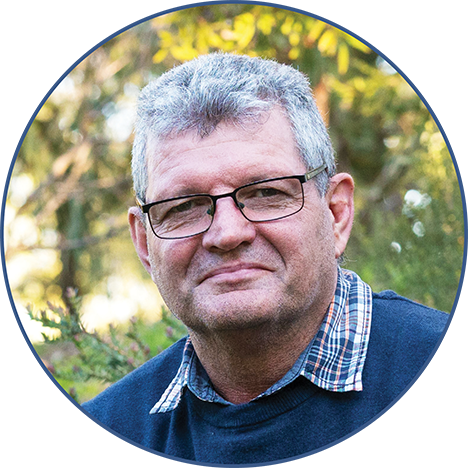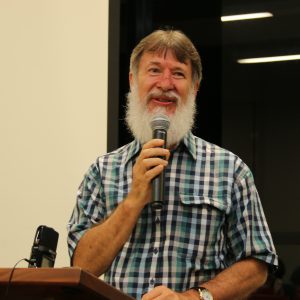Partnering in Bible translation for Indigenous Australian languages
By Max Sahl | Wycliffe Today Spring 2021
Wycliffe Australia is very proud of its members working in translation and Scripture engagement projects right here in Australia. In our own backyard, we have dozens of Australian Indigenous languages, many without adequate scriptures and many facing extinction. The opportunities for preserving Aboriginal languages and culture are huge and we are praying to the Lord of the harvest to send workers into these ripe fields.

In this edition we rejoice with our partner AuSIL (Australian Society for Indigenous Languages) as they celebrate 60 years of working with Indigenous communities to record languages and give God’s Word to people in a way that speaks to their soul.
I was privileged to meet some of these committed people on a recent trip to Darwin and Alice Springs: Melody Kube and Kathy Dadd as they ran a translation workshop in Darwin, Lucy and Alan Rogers engaging Indigenous Christians through ethnoarts, David Blackman finishing the translation work in the Alyawarr language, and Ming Fang and David Strickland getting ready to dedicate the Anmatyerr mini Bible.
I am sure you will appreciate them all the more as you read their stories, always remembering that the Lord of the universe uses ordinary people just like you and me to do extraordinary things.
Image care of AuSIL
The future looks bright: capacity building for Indigenous leaders
By Deb Fox | Wycliffe Today Spring 2021
In February this year, Dr Philip Townsend was officially inducted as the new Director for the Australia Timor Group (ATG) which oversees the Australian Society for Indigenous Languages (AuSIL) at an event in Darwin. (No, he’s not related to his namesake William Cameron Townsend, founder of SIL and Wycliffe!) Phil takes over the role from Alan Rogers, who served faithfully as interim Director for two years. Philip and his wife, Lesli, worked in a central Australian Aboriginal community and then as missionaries in Papua New Guinea.
 Philip says he has spent most of his life as a ‘guest’ in remote, cross-cultural, bilingual contexts, which developed his keen interest in cross-cultural communication and Bible translation:
Philip says he has spent most of his life as a ‘guest’ in remote, cross-cultural, bilingual contexts, which developed his keen interest in cross-cultural communication and Bible translation:
When I was 15 years old, I sensed God saying I would be a Bible teacher. He directed me to cross-cultural ministry. I became a school teacher and worked for three years in the bilingual school at Pipalyatjara community in the Aṉangu Pitjantjatjara Yankunytjatjara Lands (APY Lands) in the north west corner of South Australia. I started to learn Pitjantjatjara and was friends with Paul and Ann Eckert, who were translators among the Pitjantjatjara. I spent most of the next 23 years in Papua New Guinea as a Bible teacher at a bilingual training institution. I spoke the local language called Gogodala and was involved in assisting the Old Testament Bible translation project in that language.
Philip is passionate about training local people to be involved in the Bible translation process. He says that his experience working alongside local speakers showed him how vital their involvement is:
When I taught in the APY Lands, a new degree was offered by the University of South Australia to enable Anangu speakers to become school teachers. Each day, I worked alongside Aboriginal Education Workers in the school and assisted them in their professional development. Similarly, while I was in Papua New Guinea, I was involved in helping local staff at the training institution to enhance their skills and ran workshops for staff from several related sites. These experiences convinced me that capacity development of local people must be a priority. That applies to the areas of language development, Bible translation and Scripture engagement.
Philip’s doctoral research may offer a key to upskilling Indigenous leaders. In 2016, he finished his PhD which focused on the use of mobile devices by Aboriginal and Torres Strait Islander pre-service teachers to enhance their professional learning in community-based Initial Teacher Education programs. He shares
The use of mobile devices facilitated their ability, as adults, to be self-directed in their learning regarding place and time of study. Participants believed that use of mobile devices helped them finish work more quickly and fit with elements of their own cultural philosophies. COVID-19 travel restrictions and lockdowns make access to Indigenous language communities difficult for non-residents. Assisting Indigenous colleagues to develop their computer and online skills may facilitate communication with AuSIL staff and enable ongoing language development, Bible translation and engagement with Scripture.
Along with making new connections and implementing new training approaches to support Indigenous learning, Philip is excited about UNESCO’s upcoming Decade of Indigenous Languages (2022-2032). This presents potential opportunities for the Bible translation movement. Philip says he hopes that Aboriginal and Torres Strait Islander peoples will have opportunities to visit and learn from other indigenous people from around the world who are managing their own activities in language development, Bible translation and Scripture engagement. He is also excited about possible new partnerships and the involvement of more Indigenous people at a higher organisational level:
I pray that structural changes will occur in the ATG so that Aboriginal and Torres Strait Islander peoples join the staff of ATG and have a voice in its leadership and governance.
Please join us in praising God for:
- AuSIL’s 60th celebration events in Sydney (online,11 September), Melbourne and Alice Springs (both on 9 October) and Darwin (13 November)
- upcoming printing of two new translations: the Plain English Version and Murrinhpatha (a language in Wadeye, Northern Territory) with dedications likely in early 2022.
Pray for:
- recruitment of more people with a passion to work alongside Aboriginal and Torres Strait Islander peoples in language development, Bible translation and Scripture engagement
- UNESCO’s Decade of Indigenous Languages (2022-2032) to bring new opportunities and partnerships with language communities.
Photos: Steven Miles
Training future gospel workers
Wycliffe Today 2019
Alan Rogers is a storyteller. As the Director of the Australia Timor Group (formerly the Australian Society for Indigenous Languages or AuSIL), he connects with a range of different language groups in the Northern Territory and throughout the Top End. Aside from meeting with translation teams, providing guidance and support, Alan has a passion for seeing Indigenous people connect with Jesus’ story through God’s Word. As many First Nations people are from cultures that pass on stories orally, Alan and his wife Lucy have been helping them to record Scripture and worship songs in their own languages. Over 650 albums have been created so far. Some of the albums Alan has recorded have some incredible stories behind them.
Something that Alan and his team are passionate about is encouraging the use of Indigenous language in churches to help raise a new generation of gospel workers. There are 21 different translation programs in progress throughout Australia with ATG. Alan says that the best way to move forward with these projects is to train Indigenous translators in biblical studies:
We need to have more Aboriginal people trained in how to look for parallels in a Bible passage to help make explicit that which is implied—otherwise, the people are just listening to a story. Nungalinya College currently has 15 Indigenous students studying the new Diploma in Translation this year. I think this course will be instrumental in training Bible translators who can connect with Scripture on a level that non-Indigenous people would not be able to.
Greg Anderson, Anglican Bishop of the Northern Territory, agrees that ‘the best clergy we can have here are people who used to be Bible translators’. The full revised Kriol Bible (2019) involved Indigenous people with a heart for keeping their language, culture and faith alive for future generations. Alan shares, ‘If we can inspire a new generation of translators, we can achieve similar results in other languages.’
Click here to help fund training for more Aboriginal translators


 Philip says he has spent most of his life as a ‘guest’ in remote, cross-cultural, bilingual contexts, which developed his keen interest in cross-cultural communication and Bible translation:
Philip says he has spent most of his life as a ‘guest’ in remote, cross-cultural, bilingual contexts, which developed his keen interest in cross-cultural communication and Bible translation: Thanks for your patience...
Thanks for your patience...